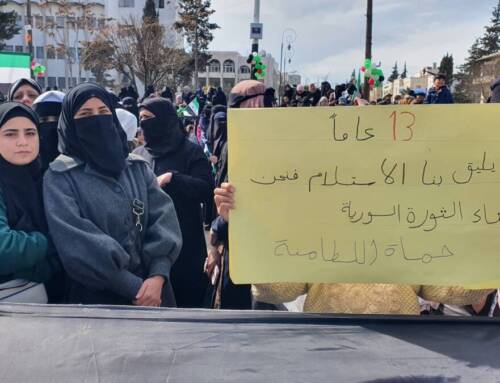‘The sound of screaming for help can’t be described with words,’ says Idlib council member of airstrikes
Tens of thousands of Syrians are on the run, fleeing […]
14 June 2016
Tens of thousands of Syrians are on the run, fleeing a two-week wave of airstrikes on civilian targets across the cities and towns of rebel-controlled Idlib province.
An estimated 120,000 people have already left Idlib city and fled to “neighboring cities, villages, farms and fields,” Yaman Hamo, a spokesman for the Idlib Provincial Council, charged with providing basic services to citizens, tells Syria Direct’s Noura Hourani.
The most recent bombing struck a vegetable market, killing at least 30 people and injuring 50. Despite the airstrikes, Idlib province has become an unlikely haven for hundreds of thousands of displaced Syrians who have few, if any, remaining options.
From January to April of this year, 25,000 Syrians arrived in Idlib from A-Raqqa, Homs, Aleppo, Al-Hasakeh and Latakia provinces,the UN Office for the Coordination of Humanitarian Affairs reported.
But those displaced are on the move again, Hamo says.
“These recent bombings caused panic among residents,” said Hamo, who has served on the council for nine months. “The bombings were unexpected, so people left at night with only the clothes on their backs and fled under the open sky to the countryside.”
Q: How many people left? Why did so many leave?
Our latest statistic says that bombing has displaced 160,000 people within the province. Of these, 120,000 people have fled Idlib city.
Idlib city is relatively calm compared with other parts of Syria. These recent bombings caused panic among residents.

Q: Where did people go? How is the humanitarian situation?
They went to neighboring cities, villages, farms and fields that have a percentage, however small, of security.
The humanitarian situation is dismal. The bombings were unexpected, so people left at night with only the clothes on their backs and fled under the open sky to the countryside. Those who don’t have relatives to stay with are sleeping in makeshift camps.
People are fasting for Ramadan in this intense heat and they don’t know how they’ll get food or water.
Q: What procedures has the council taken during this mass exodus?
As the provincial council we are doing what we can to secure the lives of people who have experienced vicious, unexpected attacks.
We announced a red alert and contacted humanitarian organizations that work inside Syria to prepare camps and shelters for the wave of people that is expected to become critical. Until now, the response from humanitarian organizations is weak.
Q: Does the council have any plans to curb this expected displacement?
We can’t prevent people from fleeing death. People are looking for security.
If the situation continues, we will help residents move to other places and provide temporary camps.
Yesterday [Monday] a plane struck a outdoor market and killed children and civilians. As long as these massacres occur, displacement will continue.
Q: Have you been near any of the bombings?
Several times I have been near the bombings. For a moment I felt like I lost consciousness, then fear took over.
You see people running aimlessly. The sound of screaming for help can’t be described with words.







